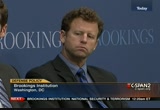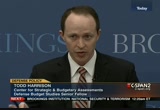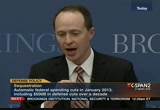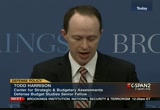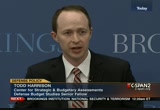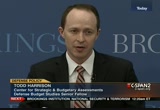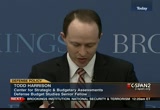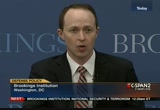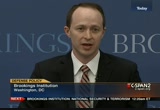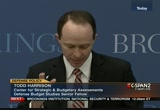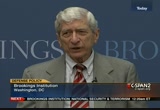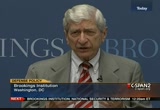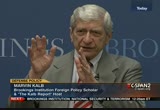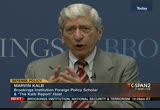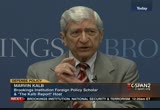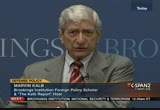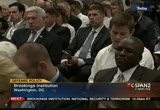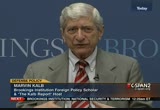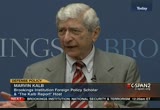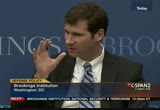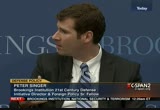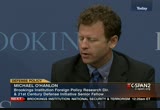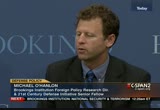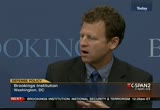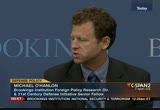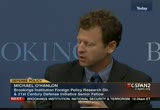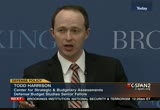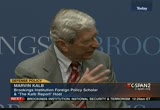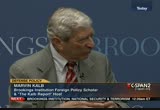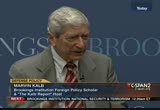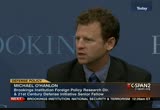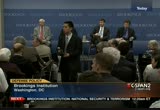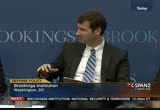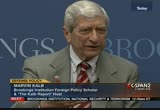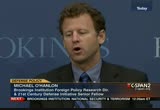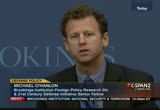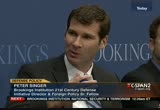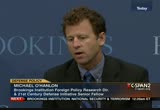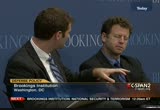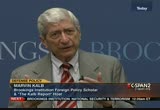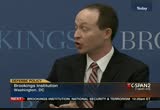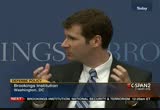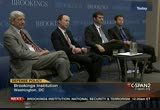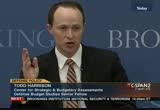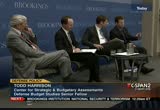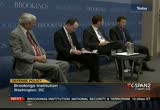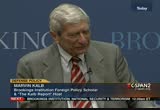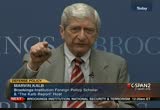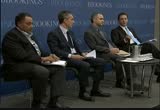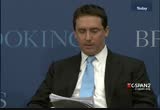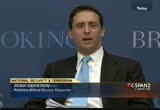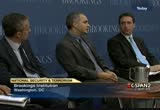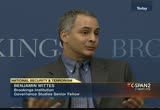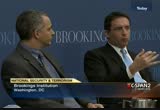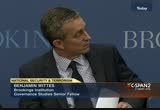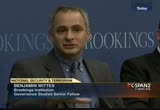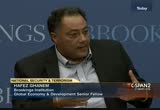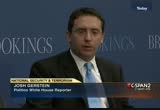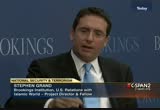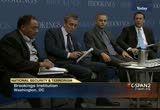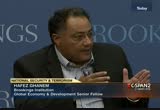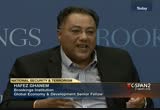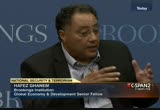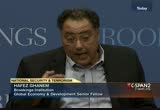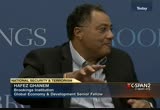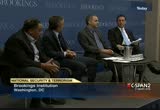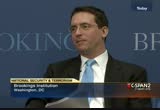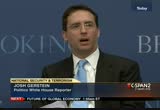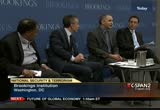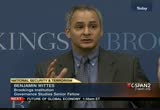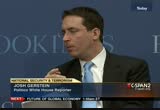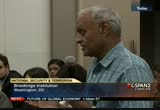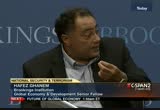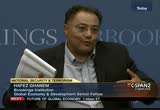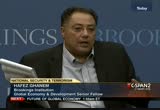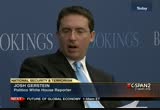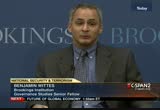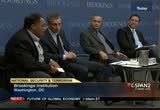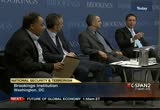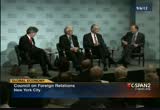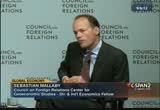tv Capital News Today CSPAN September 10, 2012 11:00pm-2:00am EDT
11:00 pm
now, the challenger, mitt romney doesn't have such a detailed plan. quite simply, i don't blame him, he doesn't have to submit a detailed budget request as a candidate. we don't have a lot of the specifics about what he was planning to do. we know that he would boost funding for defense and he would keep it at about 1.5 million. we are comparing plans with very dissimilar levels of detail. now, i think that there are many areas where they do agree on things. i think that they do tend to agree with each other on the shift in strategy to focus more on the asia pacific region. listening that is also less emphasis on large-scale ground
11:01 pm
operations. i don't think there's that much difference between the two campaigns when it comes to these issues. and also avoiding defense sequestration. they both agree that we should have cuts. they are about differences and i think that there are a few specific differences worth noting. one is missile defense. when the obama administration came into office, they did not cut funding for missile defense. they kept it at about the same level, about $10 billion a year. but they shifted resources to focus much more on other things. these are systems like patriots, it is good for helping protect our forces overseas were -- now,
11:02 pm
national missile defense systems are really concerned with protecting the united states in particular. the obama administration changed our plans for european missile defense to leverage the existing missile defense system and put that system sure first in romania and poland later on. they also curtailed the ground-based midcourse. they stopped it at 30. i think the wrong administration would actually probably go back and change the balance again, much more in favor of national missile defense systems and we have actually seen in congress, republicans have been pushing the idea of deploying some of these ground-based and
11:03 pm
interceptors on the united states disclosed. another area of specific differences in shipbuilding. it is an imperfect measure, but the total number of ships in the navy -- it actually reached a low point at 279 ships, i should say. that was in the bush administration in 2007. we have come up since then i think we were about 280 ships right now. the obama administration plans to bring the shift count up to about 300. the goal is still 313. but if you look over 830 year shipbuilding plan, and averages over 30 years. so if we gradually work up to
11:04 pm
that, that would have immediately once he took office and 75 ships over the next 45 years in the obama budget. romney has not indicated what types of ships he would buy. that makes a difference. not only in the cost, but also in the type of force to end up with and what kind of threats you would be up for. if you want to buy small boats, surface ships, disorders, or aircraft carriers, are you going to buy submarines, like the virginia class submarines. it's not clear. it targeted the number of 15 ships per year. the third area of difference, and this is a little bit -- the water is a little more murky as the drawdown to afghanistan. the president has said that online for 2014. not entirely clear what that means and 2014 and how many
11:05 pm
chips you believe in afghanistan. it seems if anything, there might be an incentive to accelerate that drawdown. not to move the timeline up, but move the floor to floor it and then lowers we drop to a lower number for 2014 and beyond. i haven't seen the stated policy, but that is the information right now. romney has criticized the plan. setting the date of 2014 and the fact that we are already starting to draw down forces in afghanistan today. that implies that romney would slow the drawdown. in specifics about what he would do. of course, the obama campaign to mention that romney did not mention afghanistan at all during his convention speech. that highlights is not a major area of disagreement. not one that they want to highlight. there are also external factors at play here. but neither candidate can control.
11:06 pm
i would divide these into two camps. there are physical factors that are external and they cannot control them on their own. it depends a lot on the economy and what is happening in the economy over the next months and years. it depends on what happens to tax rates. things like social security social security spending, medicare, medicaid, health care reform. it depends what congress does on these big issues. if tax cuts get expanded, that puts more pressure on the defense budget. if the economy grows more slowly, that puts more pressure on the defense budget. you know, as health care reform -- it does not affect bring down health care costs, that more on the health care budget. for the past two years in the 2011 budget and the 2012 budget, congress cut more than $20 billion from one obama requested.
11:07 pm
so congress has been in the mood of cutting the defense budget lower than what the administration and the pentagon had requested for the past two years. the high point in defense spending was in 2010, and that is when you had obama in the white house and you had democrats in conrol of both the house and the senate. so it is not what people think in a lot of cases it comes to defense spending. and he is doing the cutting. the other fiscal factor here that we need to look at his growth and military personnel costs within the budget. it is already a third of the defense budget. the obama administration put forth some proposals that are not popular in congress to rein in the growth and personnel costs are those are basically dead on arrival right now. costs are going to heat up and eat up more and more of the budget. also, we spend about $125 billion a year on peacetime readiness and training of our military. one of the priorities preserves
11:08 pm
readiness. keep our forces at a top level of readiness. it is not clear if there will actually be able to keep doing that in the future, especially as these costs do you do when you look at it in the costs per flying hour, costs per day for ships. and it's not clear we would be able to maintain that in the future. last, in terms of one policy, a lot of external factors here come into play. conditions on the ground in afghanistan. they are rather unpredictable. it is not clear if in 2014 we will be in a good position to withdraw as planned. also, iran and whatever israel might choose or not choose to do with regards to iran and their nuclear program. also, you know, both camps are in favor of this asia-pacific
11:09 pm
region focusing more on asia-pacific. there are also a lot of tensions they are amongst our allies and partners. not just between our allies in china, but amongst our allies and partners there are a lot of things that need to be resolved. and if they are not able to work out these things amongst themselves, that could complicate some things in the asia pacific region. this is not a bipolar competition. this is very much multipolar and that could really complicate the defense plans in coming the coming years. that is all i have. >> wow. we have heard two experts on budgets and defense policy. i am not there. i think i am here to provide some political moods. i ask you to think back to the presidential campaign of 1984. when a former senator from
11:10 pm
minnesota, former vice president under jimmy carter asked ronald reagan and the american people a very simple question, where is the beef. what he was getting at there is that you could listen to very lovely, thoughtful, poetic forecasts and what candidate would like the united states to be and do at a certain point. but how do you do it? and where is the catch? i think that really cuts to the very heart of where we are at this point. not only were we are as a nation, but in the course of the campaign. romney would like to present an image of a new american toughness. self-determination. a willingness to take risks to project american power. he wants american exceptionalism
11:11 pm
recaptured once again. and he is saying to the american people that if he wins, this is in fact what he promises you. obama is a bit different and we now have almost four years of experience with him. he clearly wants continued strength. but in the broader context of alliance cooperation, in other words, he is willing to have what he calls smart cuts in defense, if that is possible. one of the assets that he has leon panetta has butchery of defense. pineda, some of us may remember, was the chairman of the budget committee in the house of representatives when he was a representative from california. when president clinton came to office, pineda was appointed head of the office of management and budget. pineda understands budgets. and he more than anyone else during the clinton years was one
11:12 pm
who projected in protest of the idea of a balanced budget which is what happened at the very end of the 20th century. whether it be obama or romney the same set of problems recast for political advantage, the winner is going to face the same political environment the president obama faces right now. meaning essentially the same kind of economic realities that he will have to work with is obama is working in right now. budget cuts, in other words, could end up determining the shape and the look of america's defense policy. in other words, you would like to have it backwards. he would like to have the perfect policy conceived by
11:13 pm
experts and there would always be the money to be able to have that kind of policy. what i am suggesting is that we have reached the point in our political and economic development where the idea of national defense, being assured of enough money to do the job, maybe the case. but i think for the first time in our history, we may be facing a moment when we really do not have the money to do exactly what it is that the experts were the political advisers to a president suggest is the best thing. the pentagon is doing its job when it comes to a scenario where every possible problem, the turmoil in the south china sea,hat we do about china, are they friends or enemies -- who knows -- but the pentagon will have a way of addressing each
11:14 pm
one of these problems. but it is all at this point. it is all theory. it doesn't become reality until the president says it wants to do this or that. let's do this. and then someone would raise the idea that yes, that would be very nice. but what then do we do about health care? what then do we do about education? what then do we do about energy? i am simply stating that national security issues always assumed to have enough money. they may not now have enough money to do what the experts suggest that we ought to be doing. so what do you do if you are a president? you try to strike a good sensible balance between national security and everything else. what presidents do not like to think in those terms. they like to think that
11:15 pm
everything else, as far as the public is concerned, more important than national defense. still we have an extremely difficult question and problem. tom mann of the brookings institution and norma weinstein did a couple of things a few weeks ago -- a week or so ago -- which they raised the question, what is going to happen after the election. what kind of political move but we have been? will it be changed? is there the opportunity with a republican to change the climate? things will become much better. or, will things continue with obama, or my republicans change their minds is obama was trying to suggest last week at the democratic convention. to see the light and turn it all
11:16 pm
around. well, they say that is not likely to happen. and they want to throw in their 2 cents and add to that conclusion. i see nothing that suggests that if either one of the two presidents -- that either one will face in that moment of glory and victory, the opportunity to significantly turn around where we are now in terms of political gridlock and limited economic opportunity. from a public relations point of view, ask yourself the question. what if the president wants to suggest a new term or a new presidency? certainly not downbeat negative
11:17 pm
news. he wants to project something that is positive. something that says to the american people, we are on a new course. now, there are experts and i have mentioned a couple who think that it's not likely, no matter who wins. so i ask, what element of american society today is capable of standing back and pointing out the lies, the incomplete truths, flat-out untruths, deception. what outside force is there. in my belief, it is only the media that has the responsibility of trying to call the shots, not in terms of determining policy, but in terms of saying that this is more or less bright and backed up by the right evidence, this complete isn't true. students of mine have asked me, or are you, really?
11:18 pm
are you optimistic that the american media today can do that? my answer is that on monday, wednesday, and friday, i am very optimistic. on tuesday and thursday and saturday, i think they can't do it. so where are we now? monday? i would like to leave you with a thought that maybe, through the media, we might be able to find a way, because certainly the politicians have not provided it. a way around the coming and continuing political gridlock and limited economic opportunity. but tomorrow will be tuesday and i think it won't work. [laughter] [applause] >> all right. in many ways, this takes marvin's challenge and applies it. you can imagine that there are three types of connections
11:19 pm
between the stated goals as a candidate and what happens as a commander in chief. there are things that they say they want to do that they are able to accomplish in the next four or eight years. there are things that they want to do that they are not able to accomplish, and then there is a third category of things unsaid that they are going to end up doing. would we go back to candidate obama for years ago, for him it would be don't ask don't tell. category two would be i want to do it, but not able to do it. category three would be candidate obama to say, i'm going to carry out more than [inaudible] but he did not. give me an example of each of these moving forward.
11:20 pm
candidate romney and candidate obama,, in particular, what would be a would have to do. how might the media do a better job of informing this debate. meantime a disconnect between what is said and what is supported in the american public and their understanding. it has a lot of different issues whether it is brought policy all the way down to just knowledge and budget trends. it shows that roughly almost half of americans don't realize that we have the world's largest defense budget. it is a pretty odd phenomenon. >> thank you, peter. in terms of what he will do, i think he will side with the military. the next president.
11:21 pm
yeah, okay, it makes it harder to do either one. i think the president -- i think president obama would reduce the cuts. he also wants to hold the gdp at 4%, which over time would actually be a very large difference if you really believe that. but he says it's aspirational in his own budget. i don't put that in the same category as the more specific suggestions that he offered. i think either president would probably cut some ground forces. i think either president is going to have a hard time wrestling with iran and may wind up being complicit or even conservatory in an israeli attack which runs counter to my first point, except that we wouldn't do the iran strike with ground forces.
11:22 pm
the last point i would make is that i think either president, even within his own plan, is going to need more money to publish it than currently projected. in other words, like all presidents before them, there is a mismatch to gentleman's plans and budgets. there are plans to reduce weapons or limit the growth that would require more money than currently projected. when you have firm caps on the budget framework, it gets hard to do that. they are going to need to come back for more money and that will be complicated where we have a binding long-term budget agreement. one last point if i could, and maybe talking queerness of a little bit. i just want to make a counter argument and you can always come back in a second. he talked historically about how we in the past to do what we wanted to do, but now we face constraints that are more back
11:23 pm
then. i'm not sure that in the past or the present, the we are proactive and what we project about what the world will require of american power that we can really claim that ability for either the 1940s, 50s, was seized or 70s -- or today. if you think back to the 40s, we didn't have enough money to keep a boatload in korea. we took all these nuclear weapons in the 40s about vietnam era. nixon had to pull back and say we are not going to be ready for these multiple wars because we can't afford it. a similar moments where we are today. in the 1970s, we arguably have worse post- world war ii defense planning decade and it led to a hollow force for the quality of the people in uniform was not as high and nowhere near as high as
11:24 pm
it is today on average. we have rampant problems with certain things. we are still operating under a construct that says one big war in europe and others elsewhere. when strategists could never be so specific to that would be enough. since that time, we have tried to go about capabilities. we really couldn't fight two wars at the same time. we were incorrect in our assessments of what might be needed for a two war capability. the fact that we are having to choose today about where to plan and how to keep our aspirations and appetites in check, i would argue that it is not that new. but it is just as well. because we have no monopoly on that anyway and we need the budget and strands.
11:25 pm
i actually like the interaction of american politics between defense strategists and budget specialists saying that we have a few other things worry about, too. >> to pick up on that, before it gets your specific question, it is always an interesting interplay between strategy and budget. i don't think it actually would be ideal to set your strategy like this. and this is what i want the military to be able to do and then budget that. i think that would be too simple. because then he would end up with a strategy you couldn't afford. if you want to plan for a number of, you know, complex things at the same time, why not 14 rather than two. strategies and budgets have to be developed so they can come up with what resources are required
11:26 pm
to execute that strategy. let's talk about what is fiscally responsible and what we can do to avoid that. unfortunately, all too often as you alluded to, it is the budget that comes first. we try to fill in the strategy behind it. i think both camps are guilty of this. whether it is 4% gdp. if you pick an arbitrary percentage of gdp, and 4% really is arbitrary. i can't find any rational basis for it. it is not a post-world war ii average or anything. but if you just take that, you are putting the budget on it and you're trying to fill in a budget that is trying to fill in that strategy. and you say i've got constraints in the budget control act, and you also try to fill in the strategy behind it. you know, i don't think those are productive approaches. to your specific question, peter, the obama administration
11:27 pm
and their ability to accomplish things, i think the drawdown in afghanistan -- i think they will complete that soon if not sooner. i think the reduction in strength like mike said, about $100,000 and they will go through that. what they probably won't be able to achieve is avoiding sequestration in a way that they want to. it's not even clear if they will be able to avoid it. on the wrong side, i think the plan to increase in ship building -- i don't know if they will get to the 15 ships per year, but they will be able to shift more resources to shipbuilding. i'm not sure it will if they will be able to do that or not. the planned growth in the defense budget, i think it is unlikely. there aren't a lot of specifics about what they mean by that. they do say it is the base defense budget and i look back
11:28 pm
and we haven't spent 4% of gdp in the base defense budget in over 20 years. so is it likely that we will go back up to that? a especially as we are trying to do so. if you gradually wrap up to 4% of gdp, by 2171 our president leaves office or is running for a second term, that would be 39% more in defense spending than the obama plan would be for 2017. that is a significant increase. now, the thing that both administrations, but regardless of who wins the election, the full thing that they will have to confront that no one wants to talk about right now is something that i alluded to earlier. military personnel costs. military personnel costs have been growing faster than the rest of the defense budget. this includes pay and benefits and particularly health care cost. if you look back over the past decade, the cost per person in the military grew by 46%,
11:29 pm
adjusting for inflation. 46% on a per person basis. if we continue that level of growth out into the future, by the year 2039, military personnel costs would consume the entire defense budget. now, will not going to let that happen. what will happen is that if we can't control the growth, how we adjust? we will reduce military personnel and it will contribute to growth and you get the point that you have a military too small to really do anything. so i think that that is the fact, one of the factors, but not in the next presidential term, within the next two presidential terms, they will have to come to grips and they will require some unpopular decisions to push that through. the mark extremely interesting. going back to the sequestration, if, in fact, u.s. is going to have to act on that, it is not just the numbers that you're going to deal with what
11:31 pm
extremely important element in our society. everyday with the growth of talk radio. in what way can you keep the media focused on doing the right thing? it is extremely difficult. right now editorial decisions are reached politically. let's not covered that budget story or other issue with defense policy. they have a very unlimited budget. and they're reaching for the unrealistic goals and at the same time do the right thing. they are trapped.
11:32 pm
there are many people with the media who know the right thing, what to do the right thing but find they cannot because they are constrained by economic reality is in the vacuum of solid the dish up but we don't have that today. either networks or major newspapers. >> please raise your hand. wait for the microphone then introduce yourself. of questions end with a question mark. >> what difference could
11:33 pm
there be between the obama term and another administration. [inaudible] >> the rand paul sea will be close to the center. with missile defense the obama administration would be interested to find a way to smooths relations with russia against the european missile defense and to structure -- of the structure he cannot give putin the past also doesn't feel the hypothetical plan needs to be set in stone.
11:34 pm
where romney strong views would see it to establish being bonafide to back up the campaign trail. even though the talk of the strategic threat was overstated. he did not repeated in his speech but made it clear we do need to stand up to russia. european missile defenses another clear point*. also strategic arms control is of the three people i have been mentioning, obama may be the only three to pursue but russia's forces are coming down for economic reasons. they could find another reduction treaty maybe even another -- more warheads which i don't think of romney would. >> i am a reporter with
11:35 pm
government executive magazine. i had questions of entitlements with military benefits. and heard the comments and my question is regarding cuts to the civilian side. i know tricare and pay is an issue but do foresee cuts to civilians working at the pentagon? >> that is a good question. the personnel cost has not been as large but dot employs 791,000 civilians full-time equivalent. that is about 70 billion of
11:36 pm
the annual defense budget. all over the world. primarily united states that will be a target in the future for budget cutters because they don't have the lobby influence that personnel to. you get the services riled of it could talk to congress on the hill. the duties of billions don't have quite the influence. plus it is not clear what they are doing. they do lot of great work from mulling the grass to oversee billion dollar acquisition programs. quote could be trimmed the
11:37 pm
number? of course. but too far you risk not getting the job done or not sufficient oversight or use military personnel to do the same job. sequestration with the obama administration said the letter to congress they say they will use their authority to exempt military. nobody uniform will not lose their job benefits will not be cut with the exception of health care. but the deity civilians there is no such authority to exempt them they would be subject to sequestration and a cut happen 1/4 of the way for the fiscal year six 1/2
11:38 pm
to make up enough for the remaining nine months since you have to cut 14% that is 108,000 people along the way the more you have to cut. deities of billions will really be on the chopping block. just in the future years. >> what about the furlough? >> yes. you could furlough if they retroactive tried to fix its orbit is just zero one-year agreement you can bring them back. absolutely. >> and the disconnect between what is reported with sequestration and on the campaign versus the
11:39 pm
reality. let's give somebody on this side an opportunity. >> over the past 20 years for their defense several occasions we've had her insuring from our allies looking at just japan and europe there doesn't seem to be money any more. how does that play out in the future? what strains are with the other countries? >> that is the difficulty working with the budget. you could count on that but
11:40 pm
now you can't. so it only increases the burden of the decision maker coming up with something sensible on the side. and also says the way america is regarded around the world today. the u.s. the only was the superpower but now the help is not available. and there are questions. questions are raised about the global capacity of the united states whether it can do the same thing today. raising further questions of the reliability of doing a policy.
11:41 pm
president said this and somebody can say so what? but the very fact the question existed makes such a difference with u.s. power. >> also there may be a serious of opportunities that were off the table that may be moved with the primary allies. there maybe certain reforms that are not achievable until you get to the tough times. talk about the cooperation between the u.k. and france where we see the
11:42 pm
redefinition of burden sharing, interoperability, t wo things like a joint training, even concept of the aircraft carrier from one country manned by personnel from another country. my bottom line is if britain and france can figure out how to do this may be the u.s. would look at that like britain and australia. we may see more of that with the tougher budgetary times. >> with burden sharing there is a happier story that we should not lose sight of. i a agree there are opportunities look at the overall strategic picture of 2012 it is a good picture
11:43 pm
globally. we heard about the size of our defense budget. on top of that, our allies account for another 35%. even the countries we're right about may not be an adversary. this is a much better world to the then. good discussion of decline is turned upside down needs to be balanced and not to do my imitation but this is what the strategy was supposed to create. generally democratic and often aligned with us.
11:44 pm
and in support of similar goals. i am also glad of the world of 2012. >> there is a legitimate reason to be concerned look at the base defense budget 3.5% of gdp and a sense of our closer at 1%. poland is one of the better ones. but if you look at that is their the effect going on? we are paying for european missile defense these are
11:45 pm
legitimate questions people will start to ask the questions more and more. if we just spend less it does not always work out that well. in this of hedgehog security approach. but what if they don't? it is a tough problem to deal with one way or the other. >> good afternoon. they give for this great panel. and to talk about good drawn strikes what is the future
11:46 pm
of asymmetrical operations would be more cost-effective not to use large deployment and ground forces such as afghanistan? >> the issue of pulling back with candidates' personalities and the broader trends behind it. we will not see that technology or for others like cyber weaponry will not go away. it is becoming more commonplace both our adversaries and it grows more and more capable. to play the ramp up of the
11:47 pm
strikes but it doesn't talk about they also carry more munitions. if it carries one bomb then another guy has the plane to carry six the one in the future will have more munitions dropped. that is what played out with the advancement of the weaponry. the technology is more advanced both obama and romney will have that their tools. i don't think we will turn away. i don't think we have seen any indicator obama would shrink the members. -- numbers. still at the phrase of
11:48 pm
cannot confirm nor deny but we will talk about it or elite it but mitt romney has not shown he would reduce it. it goes to the popularity of the programs with public polling and gives you a work around to the challenges of the past two not send people into harm's way. the challenge both will face is the external factor congress on the right and left it more uncomfortable with their lack of oversight and input to. and the growing discourse. it would make it more difficult.
11:49 pm
more questions will be asked more fight came off legislation over the last four years. >> bruce adjusting the need for a congressional resolution authorizing? >> i am suggesting congress there is a bigs a bigger trend h the executive branch. congress has not declared war now on the 70th anniversary of 1942. then you have to work around attempts of the war powers act through vietnam. congress is largely quiet to. but we start to see attempts
11:50 pm
to start legislation or a letter to heads of agencies. not just one party but parts of both parties. whoever is the winner will have more pressure. and member of the democratic party may be more vocal than they would have been. >> of thoughtful answer. three points. that magic silver bullet people are under the impression. jones of effective backed up with good intelligence. we spend $80 billion on intelligence. effective in pakistan because of the ground forces in afghanistan.
11:51 pm
or we would not have the human intelligence and that cost us 100 billion pre-year. it will not sustain that in the future but even though libya was the tryout and has not been a repeat performance and they could decide the wars in their favor we would seek progress by now that would have been ushered dan but that has not happened. as much as they are the important tool, rightly so it is not always a silver bullet. >> what we have today is only useful in the bill with
11:52 pm
no air defense where we already own the aerospace. they cannot operate in the denied environment with surface-to-air missiles to shoot them down. if we maintain this advantage 1/2 to increasingly shift technology and communication link has to be protected. >> that is an example of a big topic of defense for the next four or eight years to have these debates how far to go now much to invest and
11:53 pm
then questions of the law and what happens? you will not hear them talk about but arguably everyone applies to cyber how much can a president utilize? in terms of the executive branch. which agency is involved? that is what the commander in chief will deal with the we and not talking about because we have straight budget issues. >> thank you for the statement that you just made. talk about sharing the burden because not that
11:54 pm
secretary panetta went to the asia-pacific recently so low the significance is the diplomatic defense. would you give us the numbers of the budget? together. i believe that is the smart way to defend ourselves. more allies and internationally allies could fight for themselves everywhere else. to improve the presence from
11:55 pm
the asian pacific and right now in virginia of plug in is going on and it is to be here. this week. will you give us the number of the budget. that is big. we should say congratulations to president obama's. >> a sharper point*. how might the two candidates feel differently with the non deity part of security? dc a different approach not
11:56 pm
just in each of big picture but how they handle the specifics. >> this is a very hard question. overall spending in the range of $50 billion. roughly 10% but on pakistan has argued reach should shift more aid to the civilian side and be tougher with their military. there is some merit to that. on the broader era of awakenings we have a huge stake in the gym to.
11:57 pm
to the extent new government wants to make tough decisions we have to support that with economic help. i was glad to see the major amounts of funds that we need a friendly and stable egypt. sometimes tough love you increase one area and cut on the other. sometime another less effective form. >> i cannot play moderator with former host of "meet the press." >> what about mitt romney vs. obama? to they take a different approach?
11:58 pm
today have of fundamental approach? >> i have not heard either one talk about the two countries. i could speculate pled to i don't think the their candidate and it gets back that we need to draw them out do have a flavor. and romney tries to suggest if he becomes president it is a reaffirmation of american exceptional list of.
11:59 pm
some more of an emphasis on defense of the military then what secretary clinton is working on right now. there is a distinct difference what mitt romney suggest his administrations will be like and what the obama administration is. there is a clear difference. one attempts to reach out the other attempts to be muscular and strong. >> first of all, i apologize. i don't have the specific numbers but in the neighborhood of 50 billion. i tend to agree it is hard to read the actual differences between obama and romney that maybe more
12:00 am
of rhetoric than action it would be similar because so much of foreign policy is not at internal domestic politics but who would have thought we would be doing anything? who saw the arab spring coming? vujacic depends on world events. >> when a candidate says something, the record is clear he can be held to that because quite often the candidate is very cautious
12:01 am
what he is prepared to say. the suggestions repetition repetition, romney has been reasonably clear he will try to be much more aggressive with respect to iran than obama. making fun getting the hand slapped back but my gut feeling is the reality will dictate one or the other in the same way. i think it is fair to say if romney would win some groups could say you were suggesting something -- something quite different. >> the reason why he is more
12:02 am
specific there are not options. if you play that out to where do the airstrikes end? does it escalate? in the campaign you don't want the answer and the obama administration they don't want this to become an issue because it is unpredictable. they applied to to deal with this right after the election. the reality is determined of what we cannot control. >> how we approach our thinking and a presidential
12:03 am
election and is all about that person but yet to it was secretary clinton's trip, all of their appointees have much more shaping power who is a secretary of defense and secretary of state? personality matters. think of secretary rumsfeld while on the one hand you could never drop out to who you would appoint but the type of people what to buy your examples of the best?
12:04 am
i don't know what romney would say. >> that would be a better indicator. >> i want to to be the moderator of repress. >> because governor romney has been specific but not diplomacy looking at the budget the various organizations that would try to size up both candidates overall projections to hold out the reality while claiming to reduce the deficit. i never thought i would miss
12:05 am
ross perot. [laughter] obama has been more specific but governor romney talks about aspirational plans not lower revenue but not specific he has not wanted to eight reit elderly there. obama's budget to publicly held debt at 75%. romney would have that at 90% over a few years. the best we can tell is a little less rigorous and does not have money for
12:06 am
diplomacy or aid. >> >> you have done a great job describe the differences. what are the milestones to be watching for? with sequestration in january 2nd, 2014. those types of things? >> first, it occurs before the next administration. i have seen plenty of articles but dictating what happens if obama wins with the status quo in this to
12:07 am
hard to know then greasy their results and what people are thinking. this congress and administration will have to do something. the milestone is what does the new president tried to do to come up with the deal by that time? there will be utterly miles down also still a continuing resolution for the fy 13 budget and then come out with a five-year projection which in reality will be put together before the election
12:08 am
season is decided. those are immediate budget milestones that we'll have been -- happen. >> right down in front. >> i am a friend of brookings. i cannot face the question on polling or extensive media analysis but a strong sense that many people feel the choice is between defense for welfare, helping the poor, research on drugs. can you tell us what% of
12:09 am
12:10 am
will very likely be spending more on interest from the national debt than we do on defense or medicare and medicaid. about 14% of the federal budget goes to all nondefense discretionary spending. that gives you an idea of an order of magnitude. the big items in the federal budget, on one side of the equation you have revenues. on the other side you have the big ones, social security, defense, medicare. those are the big ones. if you want to bring this is a simple choice, a simple choice of priority, is among those things. what do you want to do with revenues and social security and et etc. programs for the elderly and defense.
12:11 am
what is your reps scenario for a plan when you previously said even if i carried it out, it goes up by roughly 4%. it is basically a program on autopilot and a mandatory program, and the law, congress doesn't have to appropriate separate money for these programs easier. so even those programs will probably stay on the track that they are on now, which means that they will actually grow because they are growing faster than inflation and overall federal spending. defense would also grow. if revenues don't go up, as mitt romney has said, they will stay about the same time you cut rates and you would also eliminate some deductions so it would balance out. you have the revenue side of the equation that is basically the
12:12 am
same. you're spending is going up in all categories, like social security, medicare, defense, medicaid would go down under the mitt romney plan. if you look at divine plan, that is what they are talking about doing. block granting it and that 14% for all nondefense discretionary spending, that includes the budget for the state department and homeland security, it includes veterans benefits. some of the veterans benefits are mandatory. things like faa order traffic control or nih, medical research, scientific research programs treat all of that. it would have to be cut pretty steeply. to make all of this add up, or, the other alternative is you don't get any more revenues but you do spend more on the programs and you hold some of them accountable and you run a higher deficit, obviously, that is also an option and many do
12:13 am
that in this country. very quickly, to summarize, the 50% of the federal budget that president obama wants to spend on defense, governor romney, in the short term, would spend about 16.5 or 17% of the federal budget. so 15 versus 16.5. governor romney overtime, the aspirational goal of 14% of gdp between romney and obama goes much wider. maybe by 2017 would be 13% for obama and 19% for romney. in the short term it is 15% of federal spending versus 16 and a half or 17%. >> we are getting to the end of the hour here. so are there any closing or broader thoughts.
12:14 am
we will go in the same order. >> i would like to thank you, secretary for being here. i would like to say that either candidate is going to come up with innovative defense policies. because neither one has the money. i think governor romney's aspirations are less realistic, but they are looking at a defense plan that will need to be rethought in some way. we need some innovation. sometimes it will be old-fashioned issues and tightening of the belt. in other ways, it could be new innovative ways of operating. i will give an example. we may have to find a way to make do with everything currently being smaller. when we do this is having crews fly from the united states to the overseas operating areas to replace each other. the navy's own think tank has developed this idea. it is hard to do, but it is
12:15 am
already being done. also in fairness to the navy, i think that is the kind of idea that needs to be expanded and generalize because we need more innovative ways of using limited resources that we already have. >> i think going forward, regardless of the president and the administration, the math remains the same in their our fiscal issues that we will have to deal with. it will force some hard strategic choices. i look forward to getting past the election when we could see whatever administration is in charge and what they start to do in terms of making the strategic choices. the longer you they wait, the top are the decisions get. the idea that both sides are pursuing a particular budget target and saying that's what we're going to stick to and we will fill in the strategy behind it, it's not a good approach, i hope after the election, we move beyond that.
12:16 am
4% gdp, 4% for freedom. it may sound appealing for people, but it's not a strategy. at some point, you have to really put something behind it and justify it. my last point is, defense is a small issue in this election. as much as it is a larger issue for us. even the defense issue itself isn't really about defense. it is about the budget. that budget depends more on what happened outside of defense in terms of tax revenues and entitlement spending and nondefense discretionary spending. that's what it depends on. defense is what pulls out all of, after all those bigger issues. >> just a big ditto, thinking earlier to some of the numbers that were provided earlier. about 5% 55% in the national
12:17 am
defense, or even less. because it is not the central issue in the minds of the american people. therefore, it is not the central issue of the people in congress or the president or the campaign. so you have to deal with the reality of what it is we have. and what we have is not a bright horizon opening up in a another couple of months, but we are going to have to live with this, whoever wins the election. and we have to live, i think, i could argue the points that mike made earlier, but i am afraid to because i have so much respect. but there is a point at which the american people, if you followed mike's line, but this is a wonderful time to live in the old days, people still have the feeling in the family that
12:18 am
the kid was going to live a better life than the father. and that is not the case right now. that is a huge change in the sociology mentality and that says a lot about where we are, and i think we have to grow up and understand that things have changed we are not going to have it the way it was. >> in closing, for me, it is striking from the large number of important issues that are out there, especially in defense, and whenever we don't yet know about in the 2000 election despite that, there are a series of questions that we don't have answers yet.
12:19 am
there are also a series of myths and falsehoods. post- truth's policies up-to-date need to be knocked down. it falls to us in the media and in the public to begin to force the candidates to answer those questions. to knock down those assumptions. we thank you all for being part of this process today. [applause] >> more from the brookings institution with a look at national security and terrorism. it is part of the organizations 2012 project which highlights 12 major issues facing the next president. we will hear about legal issues surrounding the global site as well as the political and
12:20 am
economic roots of terrorism. this is one hour 35 minutes. [inaudible conversations] >> this is moderated by politico and talking about a variety of different issue areas that are coming up and in some cases maybe not coming up in the presidential election and exactly why they are and at what point they have the most interest in the campaign the format for these discussions has been in regards to a paper written by one of the scholars here at the brookings institution as well as a couple of responses laying out questions or thoughts or critique of the initial paper. so we are joined here today
12:21 am
starting with a senior fellow here at brookings. he wrote the main paper we are going to be talking about today along with a fellow at the von center. he is best known to me as the founder -- one of the founders of the blog that is a required reading. he does a lot of writing about national security and terrorism. to his right we have stephen graham from the brookings institution, another fellow here who works in the area of u.s. relations. then we have hafez ghanem, who wrote some of the responses to the newspaper, as to how the u.s. should go forward on some of these terrorism issues, especially in the next term, whether that be a second term for president obama or the first-term for a president, mitt
12:22 am
romney. we thought we would start of the discussion today is talking about how we got to this place in the presidential campaign and to the discussion of terrorism. i imagine you can always find just about someone addicted just about anything. but it would've been hard to predict that we would be right where we are right now in terms of where this issue is in the campaign and how it is playing. the general consensus at the moment is that national security and terrorism are an issue where president obama has a pretty substantial advantage over his challenger of mitt romney. there is a debate about how significant the issue rates with other issues like the economy. but most of the folks seemed to feel it is an area where obama feels he has a pretty strong advantage which is a pretty surprising development if you think about where we were just about four years ago -- three to four years ago. i have covered the issues over
12:23 am
the first-term and terrorism is really an issue where president obama was on the ropes for the first couple of years for his administration and his plan to close guantánamo was thrown back right off the bat by members of congress and never really recovered its footing and was eventually disposed of by the administration. by the end of 2010, the beginning of 2011. there was a public relations debacle over the effort to try terrorism suspects in new york city, and there was some pretty close calls in the terrorism area, particularly christmas day bombing attempts of the flight inbound to detroit that could've been a very serious disaster in one way or the other. the administrations reaction was not seen as particularly surefooted. it is pretty amazing that we are here just about two months before the next election and
12:24 am
somehow the president has an advantage on these terrorism issues. i guess the main event that was mentioned would be the killing of osama bin laden in may of 2011 as well as the president abandoning some of the policies that were so controversial early in his term. i thought i would start with you, maybe you want to add some other factors about how we have gotten to this place where the democrats think that terrorism and national security issues are such an advantage for them and they can basically wave them like a big flag at their convention and it often seems that mitt romney and the republicans are not quite on the run on those issues, silent to the point where afghanistan wasn't mentioned and it was glossed over this whole area that we have seen for decades as a real advantage for republicans. >> thank you all for coming out. it is heartwarming to see eight large group of people get
12:25 am
together to talk about an issue that isn't played significantly in an election. there was a time when we all thought that counterterrorism was kind of important. jokes aside, i think that josh had a serious hit on this central paradox for those parties in the way that this issue is playing in the election. which three years ago, 3.5 years ago, none of us would have predicted that this would be an issue that the president would be talking about in his acceptance speech at his convention and the republican candidate would not be talking about in his acceptance speech at his convention. i don't think -- i certainly would not have predicted that, and i don't a lot of people who would. when you look at the data, it suggests, first of all, this is an issue that the president is
12:26 am
handling foreign policy in general, but terrorism in particular. terrorism holds much more strongly on terrorism and handling of terrorism than it does the handling of other things, including the economy. nearly 65% of people said they approved in the handling of terrorism. it is a very substantial issue. he tends to pull better than mitt romney on the question. and he also tends to pool in absolute terms rather high. so it has become an area of real strength for him. now, this is a problem for the republican party in the sense that running candidates who are supposedly tough and campaigning on the basis of the supposedly gets of democratic candidates is kind of a mainstay of republican presidential campaigning. it is very awkward for the republican party to be outlived
12:27 am
on this. on the other hand, i also think there is a paradox in it for obama. and one that has governance implications should he be reelected. they are as follows obama came into office wanting to make a big change in the big splash in this issue. but the splash he wanted to make was that he was going to be the guy who close guantánamo, got us out of iraq, and to torture, and didn't counterterrorism, according to our values. he did a lot of those things and if you talk about that, there is a lot -- he had some sort of solid accomplishment along those lines. but those are not actually the reasons why he is polling at 65% on handling of terrorism. the reason he is polling that high and the reason he is talking about it in his
12:28 am
convention speech and his opponent is not is that he launched strikes and killed a lot of people. he killed two particular people in particular. one is osama bin laden and the other is [inaudible name]. the second is a u.s. citizen and the results of the aggregate of these very strong, very aggressive actions is that he has come off as a tough guy. so you have the republican party, which has been sort of deprived of a place that it expected to be. significant expect, obama is not talking about this issue the way that he expected to be talking about it at this point either. i don't mean to say that that is an unfortunate position to be in the sense that he would certainly rather be the guy that
12:29 am
got osama bin laden's nod. on the other hand, what it does highlight is that his record and operational counterterrorism is dramatically stronger than his record in doing this sort of things that he came into office wanting to do. those efforts, which josh alluded to in his introduction, they bring out a real area of failure on the part of this administration, which is that it came in wanting to fundamentally change the framework in which it was going to be operating. and it has done a much better job of confronting al qaeda than it has done in confronting the congress of the united states and creating a framework. you have until the end of next year with the defense authorization act and an almost continuing series of, you know,
12:30 am
interlocking clashes between congress and the presidency over the course of the obama administration and that he has not managed to get real control over. i think the challenge for him, should he be reelected going forward, the challenges for mitt romney would be rather different. but the challenges for obama would be really, how do you settle these relations with congress in a fashion that would be even remotely as successful as you have been in confronting the enemy. >> i just wanted to start by asking you on this issue, the political ramifications here, many of us have been trying to figure out what mitt romney's policies are on some of the terrorism related issues. he struggled at the convention
12:31 am
as a result of not having mentioned afghanistan. but when you get into some of the specifics of either the afghanistan or pakistan policy or the policy more generally, it seems somewhat hard. you mentioned wanting your papers that he favored. he wanted to reclassify them or come up with an extended version. we are about to have these presidential debates where i am told that perhaps as much as half of the time supposed to be devoted to foreign policy issues, presumably including terrorism issues. where dc, presumably romney will have to differentiate himself from the president in some way. where do you see the republicans having a direction to go here in regards to voters? >> it is a very difficult problem for them. the areas in the past are to oppose trials in federal court. for terrorists suspects, which is actually really not a good
12:32 am
idea to oppose the tools that you are likely to have to use repeatedly, and that the current administration and the former administration has repeatedly as a mainstay, particularly on the domestic side, how you handle terrorist aspects, the support of military commissions as part of the answer for that, i suppose, except that obama is now conducting military commissions. ..
12:33 am
there hasn't been on a more serious level -- there have not been any recent cases that i know of that you could even plausibly say we have had operational setbacks because of -- so there isn't really a there, there, even if you put aside the moral concerns and legal concerns. and the result is that -- i mean, i think you do have this problem of what you should talk about as the republican candidate, and the result in romney's case has been really to talk about it as little as possible, which, as i say, is
12:34 am
very awkward for him. and i think underlying that is the fact that both sides really want there to be a great difference between them on this issue, and it just isn't there. and so you end up with certain things that, for example, neither candidate is going to close guantanamo, one candidate says he is committed to closing guantanamo and one says he is committed to keeping gam, but we know that obama is not going to do it and romney isn't going to do it. so the voter has a sense there is much less difference, because obama isn't talking much about closing guantanamo these days. and there's a lot of issues. both candidates are very enthusiastic about attacking the enemy with drones. both candidates as a practical matter will use both military
12:35 am
commissions and federal court trials to try the enemy. both candidates will reserve the right to hold detainees in military custody without charges at all under certain circumstances, and both will probably try to reduce to a manipulate the number of circumstances in which they have to do that. and neither candidate is really moving aggressively against talking about how we shouldn't be -- nsa shouldn't be conducting the sort of surveillance that used to be controversial before the fisa amendments act. so you have underlying romney, silence -- real convergence between the candidates that makes him hard to identify the areas he would differentiate himself. >> do you think a president mitt romney would be more likely to detain someone on u.s. soil
12:36 am
outside the traditional judicial legal system? >> i think this is a great hypothetical situation in the case of both candidates. obama has basically said, he won't do it, though he does not foreswear the legal authority to do it. he just says he won't. romney, to my knowledge, hasn't said anything like that. as a practical matter, no president after other cases is going to be looking for a test case with which to do that, and soow going to be looking to figure out a way to deal with such a person in the criminal justice system, and so far we have always found one. hypothetically i think romney might contemplate it, but in behavior they're going to act the same. they're going to look at the detainee in front of them and say, can we make a criminal says? they're going to fine way to make the criminal case and the
12:37 am
issue is not going to arise. i agree, romney may have more conceptual willingness to do that than obama but i doubt you're going to see it tested are. at least not as long as the numbers stay small. >> the bureaucratic institutional pressures from within the government would be to stay the course is the way these things-usually handled. >> it's not 2002 anymore in 2002 we did not have very developed systems for, when you pull somebody off the plane, you have intel from the intelligence community about -- you got to do something with him. that provokes a real panic, and we've stood up the national security division, at the justice department. we have all kinds of routine cooperation between intelligence agencies and law enforcement, all designed to ameliorate that problem and make sure that when you have to confront that
12:38 am
person, you can do it in a fashion that secures your intelligence interests without compromising your law enforcement interests. those systems are not perfect. there are tradeoffs. but so far they have not resulted in a situation like padilla or al-marri, where we simply could not proceed with the law enforcement case and it was unthinkable to let the person go. >> i want to ask you one thing about your paper before we move on to the reaction to your paper. your paper talks a lot about what the next president should do in terms of trying to reach a meeting of the minds with congress on how to proceed on some of these issues like detention, probably also dealing with the aumf, the authorization for use of military force, which is the only operative congressional enactment we have dealing with a lot of these issues related to terrorism. why do you think reaching an
12:39 am
accommodation between the connective branch and the legislative branch here is so important? why do you think it maybe wouldn't be a pan see ya for the problems. and i can see people saying, look, congress, as of august 2012, gallup poll, has a 10% approval rating. most of its forays into the area when they propose riders to legislation, a lot of experts view the efforts as either exceedingly unwise and sometimes almost comical in their ham-hasn'tness. why is it so important for the president to get a congressional stamp of approval for these policies? why not have the executive branch work out these policies and let the presidential elections or whatever serve as some sort of referendum validating them? why go through this complicated dance with congress. >> first you have to go through the dance with congress because congress forces you too. if congress were willing to --
12:40 am
as it did for a lot of the bush administration in certain areas -- simply sit back and say you take responsibility for the outcomes. we'll keep our mouths shut. we won't say, don't do it, but we also reserve the right to say bad thing beside you if things go badly. then that becomes a viable option, and the problem is that starting in response to the guantanamo closure plan, that was not a game that congress was willing to play anymore, and congress passed a series of restrictions on the president's ability to transfer people out of guantanamo, including to the united states for criminal process, and so there was a very deliberate and active effort on congress' wart -- part to get involved in a way that show you're serious about getting involved merely at least as a defensive proposition in order to not have these options cut off. secondly, and i think sort of
12:41 am
less situationally, or kind of more fundamentally, it is not a healthy thing for -- to go years and years and years with the essential contures of very robust executive actions done on the basis of nebulous statutory or sometimes no statutory authority. anytime you can have the congress of the united states behind you, even with a 10% approval rating, you would much rather as president have a federal statute saying you're within your rights to do this very controversial thing than not. the bush administration suffered just terribly for not getting congress on board for things they really would have been prepared to do had they been asked. and the obama administration, sometimes against it will,
12:42 am
actually, has been through this back and forth with congress, has actually built some -- a little bit some more durable architecture that i think is sort of very salutary thing including litigation they have going on every day. >> i said the amf was the only big piece of legislation, the fisa, the foreign intelligence surveillance act amendment that the president as a senator and candidate voted for, was also a pretty significant piece of legislation, validating the nsa program and putting it in a military framework. >> and you have the military commissions act of 2009, which is a very important piece of legislation, in bringing the democratic party on board the fundamental architecture by which we're likely to end up trying shake -- sheikh mohamed and the alleged 9/11
12:43 am
conspirators. >> we're going to change the discussion and talk about what you might call more strategic or long-term pro-active response of the administration. do you want to say something? >> can i just ask a question of ben? i'm intrigued by something that you said. does this mean we have reached a bipartisan consensus on what -- where american foreign policy, at least in this particular area, should be post 9/11? >> well, everybody wants to deny. both parties ferociously want to deny that such a consensus exists because the con consent -- consensus violates those parties' self-image. the democratic party -- i'm going to caricature this for fun. democratic party sees itself as, we're the party of the rule of law, the people who live our values, who believe that security and liberty are not at
12:44 am
odds and that we can do well by doing good, and that the other party is the party of, you know, macho aggressiveness and doesn't think about the place that we're going to occupy in the world, and our image in the world, and human rights and all that stuff. and the republican party looks and said we're the party of toughness and the party that understands that, whether something is good and in your interests may not be the same, and we're the party that has the discipline to do what is necessary, even if it's not popular, and the democratic party is weak. these are very, very deeply self- -- you know, deep -- self-images of the respective political moms. so it's hard for both sides to understand the degree of consensus that actually does exist, and the degree of concept
12:45 am
sunday that -- consensus that exists is the following. we're going to use both law enforcement and war powers on a systemic, sustained level, for the foreseeable future in confronting terrorism. we're going to use war powers overseas. we're going to use law enforcement powers chiefly doe domestically and also overseas. the second is, those war powers include both the power to target with lethal force, people we consider to be part of the enemy, and the power to detain subjects who the law -- subjects to the laws of war, not subject to the criminal justice system, those we capture. third, we're going to be very aggressively surveilling all kinds of people in the course of doing those two things. fourth, we're going to use certain hybrid tools for those that we do capture. we may use military trials for
12:46 am
some of them. we may use civilian trials for some of them. and those decisions are largely going to be matters of executive convenience. and then finally, i think the other sort of core element of the con ken sunday -- this is a political consensus -- policy consensus, not a legal consensus -- is that we're going to be on offense. and we're going to be doing as much offense as possible on the basis of standoff robotic platforms because that saves or people from getting hurt. and i think if you -- i think neither mitt romney nor barack obama put in this room under sodium pentothal would disagree with a word of that. and i think both -- i think the reason they have so much trouble figuring out what to disagree about is that they both basically -- and a huge percentage of both of their parties actually operationally
12:47 am
don't dissent from a word of that. >> do you think that's fair to describe that as a george w. bush, consensus on what we should be doing, what the default should be on a lot of these policies? >> well, you're definitely right to distinguish between bush term one and term two. bush was -- bush moved a lot, and he changed. and obama has gone further down the road that bush was already moving in the latter part of his second term. and i don't think you would see -- so i see it more as a continuation of the directional momentum of the late bush administration. the bush administration learned a lot of lessons over the course of its time in office, and obama learned lessons from the bush administration's time in office. i think largely those have gelled around a certain degree of consensus, and i think, yeah, the bush administration was moving in that direction.
12:48 am
i think obama made some important innovations to further it down the road. >> do you have any thoughts bev we go to formal responses, any thoughts about ben's statements on consensus? >> well, my thought -- is that the whole debate on counterterrorism is too narrow. it misses a huge stack of issues that need to be tackled. if the security aspects, if the war effort aspects, add -- they have to be -- but there are all the other issues, social issues, political issues, that need to be -- what i would have liked to see, actually, is a debate on
12:49 am
how, with all the changes happening now in the arab world, how can we change -- how can we seize the opportunity to use those changes to fight terrorism? because i see what is going on now with the arab spring and the resolution. a great opportunity and also a great risk. and that's where i would like to see the debate in the u.s. go. >> stephen, let's start in on that a little bit you discuss in your papers some of that issue, how the u.s. can take advantage of the arab spring. you paint the u.s. i think a little bit of a bystander that this arab spring happened to from the u.s. perspective, probably worse than that. i think a lot of folks in the arab world saw, is a covered the first couple years of the obama administration, them actually reinforcing some of these rather
12:50 am
despotic regimes. in fact the -- jump starting the peace process was pursued by fortifying leaders in the arab world, in places like hosni mubarak's egypt. the president went to cairo with a speech with other goals, and even people that -- who may not be discussed in polite company anymore, like president assad, were the recipients of efforts to romance them diplomatic include during the early months and year of this administration, owl of which has been dumped at arab spring has been -- as the u.s. and the administration has tended to adopt the arab spring. does the u.s. have the credibility in the arab world to
12:51 am
be a proponent of democracy in this arab spring movement or does it have to take advantage of it in a more subtle way? the sense i get from the administration they feel the latter is the case. they can't full on take advantage of it but have to do it much more carefully, because the u.s. credibility as a result of various things, dating back to the bush administration and earlier, is kind of damaged there. >> well, i think the big question on the table is, within this institution deals with the bad guys. how do you deal with terrorism. looks out how you engage with '99.9% of the muslims who have nothing to do with al qaeda and in many cases believe they usurped a religion. and what does that engame look like? the arab spring has created these new opportunities for
12:52 am
america, and perils for america to engage in a different way with the peoples of at least the middle east, and north africa. and to your point, i think there is some reticence to get too out in front for fear that our prior reputation will undermine legitimate voices in the region that are pushing for change. on the other hand you're also seeing a great deal of disillusionment within the region about our reluctance to move more boldly, on -- syria being the most recent example, where it's felt that america -- an american presence -- talk about returning to american values -- is turning a blind eye or at least not doing enough to counter what is a tyrant turning on his own people and killing them. >> have you detected any
12:53 am
differences on those policies between the obama and romney campaigns? or their rhetoric? >> well you know, interestingly, as someone who cares deeply about what is happening in sirra, i kind of wish l -- what is happening in syria, i wish both campaigns were talking more about this, because it is an issue. if there were-there would be pressure to be a more forward-looking u.s. policy. but romney has not moved that much from the administration's position. >> do you think he is caught, the g.o.p. candidating are caught in a sense between two wings of his party, one a traditionally hawkish wing represented by senator mccain, and another wing which is the tea party wing, which is seen as -- i don't know how powerful they are but seen as resurgent and powerful, and i think tend
12:54 am
to have a more maybe isolationist is too strong a word but tend to be more skeptical bat u.s. military involvement and foreign policy involvement, and romney is trying to reap both those constituencies and the moment he gets more specific about that issue or issues ben is talking about, the moment he takes a position, he starts to undermine his standing with one of those constituencies. is that part of it? >> it's part of it. the other issue, which is becoming clearer, is the russians have put down a red line on this issue and, both for the administration and romney as a candidate, this has become an issue that is not larger than syria. this isen asia of -- an issue of what you due with a human rights problem on your hands and potential two major powers in the security council do not want to go, do you push forward or
12:55 am
not, knowing if you push forward, there could be some huge fallout in terms of longer term relations with china and the balance of power in the world. >> the paper you're speaking for here today talks about development and the youth movements, the population challenges, demographic challenges in many parted of the world and how the contribute to the problem of terrorism. to come at it from a skeptical point of view, which is the way we reporters do these things, seems that the problem with al qaeda -- it seems to be metastasizing, seems to be moving from one part of the world to another part of the world. what seemed to be originating from one area now seems to be spreading from north africa, down into africa. you heaviers in yemen and somalia that people are
12:56 am
concerned about, and seems like any ungovernable or ungoverned pace in the world becomes an area that al qaeda can inhabit. isn't that a tremendously formidable problem to tackle through improving the development of the poor all over the world? just seems like kind of however laudible that goal may be and how wise for the u.s. and others in the western world to invest in that, is it really an effective strategy of combating terrorism? >> it's actually cheaper than building all those fancy drones. and if you look at the amount of money spent on defense, compared to what the cost for fighting poverty, the cost of fighting poverty is worse. so i actually think -- i'm not saying that defense part is not
12:57 am
important. i think given where we are now, we have to invest, but in the long run, we need to tackle other issues, and really -- let me give you a few facts. i mean, the program i'm running is looking at the transition of the arab countries and economic transition, and all the questions you ask, at it how do you explain the arab revolt. actually, when you ask those questions, it often helps you define the factors that make the countries such a ripe place for al qaeda and others. let me give you four facts. the first one is that both countries are mostly young. you have 55% of the population of the arab world that is less
12:58 am
than 24 years old. two-thirds of the population is less than 30 years old. that although they spend a lot of money on education, the quality of the education system is very poor. and what -- when they do those global tests for math and science, and the 14 arab countries are participating in the tests, not one of them, not one, is at the average. they all way below average, and if you look at the youth situation, they have the highest rate of youth unemployment in the world. an example of egypt. at the largest of those countries. 85 5 thousand new entrants in the labor market every year. 670% of them have high school or above education. and those guys -- takes five
12:59 am
years to find a job. and for those of them who find a job, three-quarters find jobs only in the information sector. so they have their occasional workers and they have very -- no job security, no social benefits at all. so this is what -- this huge youth population that sees an opportunity for them. second fact. and it has to do with the politics. those same young people have -- do not have any way of expressing themselves or participating in the social and political lives in their countries. there was a survey done in egypt in 2005 for a student group, for example, to publish a pamphlet
1:00 am
in the university. it takes them six months because they have to go through all different layers of clearances by the security people. the only avenue that was open for them was through the islamic groups. some of those islamic group does good work. libraries, they have young people do some volunteer work with the poor and so on. but some of them also spread crazy ideas. and that survey found that the majority of young people in egypt had views that were not tolerant, and especially not tolerant to people who are different religions, different faiths and so on. so, you had the whole political system that suppressed young people, and that intolerance.
1:01 am
third, third fact, a huge sense of unfairness. i was looking before coming here, i was looking at a paper by gallup, done a year ago on tunisia. tunisia has been growing fast. egypt has been growing fast in terms of gdp, and if you look at the superimposed two graphs. one graph is gdp per capita grope, which is upwards sloping line, and the other graph is the question, asking people, are you silent? which is a downward sloping line. if there's a majority of countries are middle class, and the middle class has been totally left out of the growth equation. tunisia is fairly rich but if you look at yemen or egypt, 85%
1:02 am
of what is called middle class, actually live than less than four dollars a day. and this is your middle class. and if you look at the data on income distribution, over the last few years, it is the -- the size of the -- the number of people who are living rich, living on more than $14 a day, has actually not changed. so, it's not like -- 0 so the middle class has been suppressed all of this time. so there's this big sense of unfairness, and also a lot of cronyism and corruption, which -- and then there's also a sense -- this is a point that is important -- you mentioned this briefly. there's a sense of international unfairness. and that is -- leads to the palestinian issue and the
1:03 am
arab-israeli conflict. you have those four facts that are actually -- that have -- that create a right of -- all you need is wound or two crazies to blow up a place, and as steve was saying, your .01% of the population would subscribe to alaeda, very dangerous. so this is -- so if you really want to deal with terrorism, i believe that you need to have a policy that includes defense issues, but it includes a partnership for development and not just any development but inclusive development and fair in that includes a partnership for democracy, and that includes a partnership for peace. trying to find a resolution for the palestinian-arab-israeli issue. you cannot just focus on one
1:04 am
aspect and not all of the others. now, to end, the success of the current transition in the arab countries, we have a huge impact on whether we get more or less division in the future. if it fails, those countries fail and become failed states, as you rightly said, you create vacuums where al qaeda thrives. we saw it in sinai. the transition was having trouble, and the egyptian government was weakening and weakening. we fought all those groups who, -- based in sinai. the same thing in yemen. so it is a real danger, that if this transition fails, we can end up with more terrorist bases around the region.
1:05 am
on the other hand, the success of the transition will help change this current situation, will help change the statute of the united states in the region, and that the nature of the relations and the way that arabs think of the united states. >> how tight and direct do you think the relationship is between development and terrorism? you know, in the paper itself acknowledges that many of the individuals who carried out terrorist acts have been middle class. some seemed to have been above or upper middle class. and if you want to be totally macveilan about it, probably some people say that a little bit of education is a dangerous thing. somebody who is totally uneducated is not going to be able to pull off a sophisticated underwear bombing aboard an aircraft bought they have difficulty comporting themselves correctly to get on there it does seem like a lot of the people that carry out these
1:06 am
attacks have studied in london or their father was head of the oil ministry, or stories along those lines. you don't hear about people who were shepherds coming out and becoming a suicide bomber. what is your answer to folks who say, i don't think there's any real connection? >> there is a connection. and -- but you're right, the issue is not just -- that's why i said you have four unique -- four prong approach, and you need to do the social, political issues, not just the economic ones. first of all, the middle class business, when you say middle class, you have to -- middle class person in, say, yemen, would be extremely -- a poor
1:07 am
person compared to -- the issue of education. for me, education is not just learning to use a computer or this or that, but also an education that teaches you the basic -- your basic rights of a citizen, and it teaches you civic -- there's a part of civil engagement. all of this is missing, and in a system that is autocratic, trying to make sure that everybody follows the leadership rules or thought. you do not get this -- and what happens is exactly what the survey, this 2005 survey shows. it builds a whole generation of people that are partially
1:08 am
educated, that are -- that have -- find difficulty in interacting and respecting others. people with other views, from other backgrounds. >> one more thing just from you, stephen, to respond to. it does relate the campaign. one area where the man who hopes to be president, mitt, has made his position fairly clear, he is in the camp of people that believe the u.s. needs to be more explicit about talking about the threat of terrorism as emanating from islamic radicalism and there's an element of political correctness in the unwillingness of the obama administration and u.s. policymakers to publicly talk about islam, an aberrant form of islam being the cause of terrorism. do you think that he would follow through on that? do you think he would move more
1:09 am
to the bush second term formulation, which was where they sort of abandoned those ideas and went for sort of a softer approach? do you think he is just blowing smoke on that? what would be the impact if the u.s. started speaking more directly about islamic terrorism being a threat? >> i think it's -- to denigrate an entire religion base on the acts of a few is poor policy. to go about trying to -- to go about inflaming the views of 1.4 billion people because -- sort of cdss operating in afghanistan and pakistan, and other parts of the araban peninsula, who have a very
1:10 am
particular -- very warped view of a particular religion, it's a mistake, and i think that probably comes from pressure within his party, the right wing of the party to make this a political issue. i think it's one that is misguided and, two, is bad policy. >> i also think -- very unfair to norwegian white supremacy. [laughter] >> we have had a couple of, like, really dramatic terrorist attacks that should stand for the idea that this is a problem without a particular ethnic or religious or regional badge on it, and i think the -- it's possible to keep in mind the idea, at least as pertains to
1:11 am
the exercise of war powers, that congress has authorized the use of force against certain groups, and not other groups. right? and so when you think about who is the united states fighting a war against? that will actually frame it in -- not in antiislammic terms but the united states has authorized the congress of the united states has authorized the you of force against al qaeda, the taliban and associated forts, all of which are islamic groups of one sort or another. that said, to confuse the -- to confuse that with the problem being one that's essentially religious in nature, is -- it's going to -- as steve says, smear a lot of people. also going to miss a lot of terrorists. >> i think the critics to that position would say something like the ft. hood shooting, you had indications of a potential
1:12 am
terrorist attack that were overlooked out of an abundance of political correctness, where people were so fearful of being labeled as anti-islamic big gots they didn't say things they should have about a colic that was acting in an aberrant way. >> they might have been right about that. if you have somebody talking tan a very violent way, animated by whatever concerns and you suppress those concerns because you're afraid of an allegation of prejudice against the group that he is speaking on a very -- in a very violent, extreme way, as purporting to represent, i suppose you've probably earned the criticism, but that does not mean that group alone is the problem, and it doesn't mean that -- you can reverse engineer a lot of bad logic out of that, and so i -- i mean, i think when you look around the united
1:13 am
states, the spate of shootings that have happened recently has also been a reminder that -- again, what you want to define as terrorism and what you want to define as really bad incidents of violent crime, you know, gets into a definitional question that is probably not very being. i do think that there are real reminders this is not a set of problems we need to -- that we should principally think about in religious or ethnic terms. >> i would say that -- if you look at this as a issue that needs to be resolved, it is a -- united states to be seen as -- the u.s. has been seen as working with autocratic leaders,
1:14 am
and supporting those leaders for all those years. as a result today it has very little credibility. again, i would look at the poll that shows 70% of egyptians would prefer not to receive any economic aid from the united states, and this is a country that is going bankrupt. you know. so, this just gives you a feel for the extent of the bad love there. you want to change that. it is important that you change that. and you will not succeed in doing that by starting to label them all as a group as being your enemy. >> should be a partnership about governance, and if you look at the real problems of countries, it's been really poor governance, where we have
1:15 am
aligned with the bad guys, the poor leaders, and we have a chance with arab spring to play a different role, and let's play a positive role in trying to change educational systems and political systems. >> let me ask you one thing and then we'll go to audience questions. i want to switch back to the more concrete areas under direct u.s. authority and u.s. control of the u.s. legal system and the executive branch. on guantanamo in your paper, towards the end you throw a little built of hand grenade and say not only should guantanamo be kept open, but it should be expanded. and i'm wondering if you might tell us briefly why you think guantanamo should be expanded, which i think is probably a fairly unusual position among the think tank set here in washington, and also does that mean you disbelieve the very
1:16 am
earnest pronouncements from all levels of the u.s. government that guantanamo is the none recruiting tool for -- the number one recruiting tool for al qaeda? >> the second question is easy. yes, i believe that guantanamo is the number one -- or even especially significant recruiting tool for al qaeda. and actually, my co-author is actually better positioned to talk about the role that guantanamo plays in al qaeda's propaganda than i am, but my basic feeling is the relevant question is, are you holding people in extra criminal detention? if you are, whatever the facility you do that in will be a bad word in certain circles. and you're just going to have to live with that. if you move them to compton, illinois, people will find out that compton means the same thing as guantanamo, and once you decide to engage in certain
1:17 am
types of detention, there's going to be public relations consequences to that, and you have to price that into your decision to do it. i think where you do it makes very, very little difference. that's just my opinion. so, let me clarify. when obama said the was going to close guantanamo, i did not oppose that decision. in fact i -- the only things i wrote at the time were about the logistical challenges challenged political challenges associate it with getting it done. i accepted it as a worthwhile, the not the goal i would have set for the -- for an incoming president in this space, and i always thought it was a bit of a tail wagging the dog. that is to say, the relevant question should to me, where and under what circumstances, and
1:18 am
according to what results, will you engage in military detention? not what the location of the facility in which you're going to do it is. it always seemed to me that closing guantanamo was a way of talking about the location of a policy instead of the substance of the policy. >> to this day, i don't care if you do it at guantanamo bay or if you do it at somewhere else. the relevant question is, what are you doing and how are you doing it and what rules are you willing to live by in the course of doing it. i observe that guantanamo is not going away. the logistical problems i was writing about. , the political problems, actually turn out to be insurmountable given the president's willingness to put political energy into the subject, which was extremely limited. he was willing to issue an executive order on the second day in office. he was willing to give a speech at the national archive a few months later. he was willing to make a few
1:19 am
phone calls, now he is not willing to talk about it at all unless asked in a press conference, and caught offguard. and if that is the level of political energy that you are going to put into it, you're not going to get it done. and the sooner you acknowledge that, the better. and guantanamo isn't going away. it's not going away because congress cares more about keeping it than the president cares about shutting it down. and that's all there is to the story. and anybody who tells you that there's more to the story than that is fooling themselves. so, the question is, given that we're going to have guantanamo, the question is under what circumstances are we going to have guantanamo? and here's the irony of what the president has done and why i think he actually deserves a lot of blame for this. starting under the bush administration and continuing under the obama administration, there has been a revolution at
1:20 am
guantanamo. guantanamo, while we were all talking about closing it, has turned into the exact sort of model facility that we talk about closing it in order to say we were going to create. so, detainees at guantanamo have access to counsel, they get to have their court cases they get to file habeous cases that are heard up to the supreme court of the united states. journalist from all over the world visit and tour the facility. they have -- there is a lot of public evidence that gets released in the course of these habeas litigations, and once they are found to be properly detained, they are then -- have a continuing review process for as long as they're held there. it's actually promises to be
1:21 am
quite rigorous. nobody really talks about this very much because we're all talking about how we should be closing it. and the question is, what are you closing it in order to do? closing it in order to rebuild it somewhere else, with presumably the same set of procedures that we now have there. and so what i think is that -- the president acknowledging that he is in fact not closing guantanamo should rather embrace it and should say, look, i wanted to close this, but there is a branch of government that doesn't let me do that, and so what we've done is we turned it from the thing we objected to into the thing we aspired for the circumstances of detention to be. and the irony is that if the -- they made that argument there would be process consequences because there are people being
1:22 am
held elsewhere in the world who could not -- though in u.s. custody do not have the same generous rights grandit to guantanamo detainees. so i think we should bring anybody we're holding anywhere in the world in military detention, other than in certain very specific theater conflicts, but if we're holding people still foreign theater in beau ram, which we just turned over to the afghans those people whoa be at guantanamo where they get the benefit of the additional procedures you get at guantanamo that you don't get at the detention facility in other places. and i think a lot of good things would come, presumably in a second term, if we could have a little more of an honest conversation about guantanamo, which is, a., it's not going away, and, b., that we really corrected the problems that made us want it to go away.
1:23 am
>> i can tell you, having just come from the democratic convention in charlotte, that the rhetoric and policy on that's was exactly as ben stated. the democratic platform continues to call for the closing of guantanamo so in a little bet less forceful way than it did four years ago, and the president said not a word about the issue in his convention speech. >> there was a wonderful article neonon the other day to the effect that the -- all 168 guantanamo detainees -- one of them died -- all 168 guantanamo detainees were released into the democratic convention? charlotte. >> so, if there are questions in the audience, we're prepared to go to those. raise your hand and identify yourself and try to make it brief and make it a question as opposed to some sort of statement. this fellow way in the back seemed to be the first hand i saw.
1:24 am
>> thank you. i work for voice of america. my question is abouta. how do you see positions of both campaigns on afghanistan and also 2014 transition as well. >> anyone want to jump in on that? >> the question was -- >> on afghanistan, what do you see the position of the two candidates, and how would the afghanistan look different in the transition under the two different presidents. >> i think there's been some pressure on romney to push for a longer transition. i suspect that in the end that either president obama in his second term 0, president romney in a first term, would continue the current policy, which is to
1:25 am
draw down and draw down in a way that hopefully leaves behind an afghan security force that can take care of the challenge present bid the taliban. >> my view is this is another area where romney has stratled between the isolationist flank of the party and more hawkish flank of the party, and he didn't mention afghan at all in his convention speech, which is surprising given the 70,000 u.s. troops over there and he has been pointing to other speeches he said where he discussed the issue-but you go to those speeches and don't find a discussion of the issues. you find him saying we have 70,000 troops in afghanistan, which is not a policy going forward. so i think that's going to have to change somewhat either in a speech that he is about to give, i think as soon as tomorrow, on security issues, again, or certainly in these debates on foreign policy we're going to hear during the month of
1:26 am
october. this gentleman down here, wait for the microphone, if you would. >> my name is joe, and i am just an independent retired person. i'm just concerned about the u.s. policy and the use of drones in yemen and afghanistan, and i want to get your evaluation of the panel where the extent of that is helping or hurting in terms of eliminating the number of terrorists in the united states and the negative impact of the drones versus the actual reality of how many terrorists we're getting in anything you say, what kind of changes might be made if you agree that the problem is getting worse because of the drones. >> the president's first director of national intelligence-dennis blair, had made headlines by saying he thinks the blowback to aggressive use of the drones is causing more long-term damage for the u.s. than the short-term benefits. anybody want to jump in?
1:27 am
>> i don't know how to evaluate that. there's a -- the relatively easy question to evaluate is, are drones an effective way of killing the enemy? the answer to that is pretty easy to answer. it's, yes. and the reason these have become a very attractive tool of choice is because they can extend power into areas in which we do not have a significant troop -- and it can deliver with astonishing accuracy lethal force to -- by comparison to other means of attacking things that are quite remote. to very remote corners of the world. by most accounts that i've seen, including my co-author, the impact on the core enemy group has been very substantial. both in terms of the occasional
1:28 am
high-value kills but probably more importantly, in terms of the just devastation and an ongoing way of sort of the middle management of these groups. now, i think to say that it has been very effective -- i think most analysts agree it has -- raises this other question which is, is the replenishing affect greater, lesser than or the same as the takeout effect, and i don't know how to answer that in the short term. i think it is clear that -- pretty clear to me that al qaeda, the core of al qaeda, has not replenished itself in a terribly effective way. it's not clear to me, though, that other groups are not coming up in this sort of splintering mat that at the sis that's going on that will be as dangerous or more dangerous and that's a time will tell kind of question.
1:29 am
i will say that as a strategic and political matter, it is very, very difficult for any president to say, while this is an effective strategy and neutralizing a threat we face today, i'm going to forebear against the use of it because of the possibility that it may generate in the long run more people who dislike us and who will, therefore, constitute some greater threat in the long run, and this is, i think, part of the paradox of this conversation, which, you know -- i actually don't disagree with anything my two colleagues have said about the sort of need to focus on governance development and poverty, as big, big pieces of this puzzle. and similarly, they don't really
1:30 am
disagree that there are these activities you have to engage in, in order to neutralize or deal with or capture or sometimes kill immediate term threats. and so you end up with this gnawing sense that these two amibitions are not necessarily in any immediate sense easily reconcilable with one another and some of the tools are going to make it harder to use other tools, and, yes, with respect to drone use, there is this open question which is -- die think if -- to go back to josh's question whether guantanamo this principle recruiting device. right now, drone use is. and that reflects the relative preference of it in our strategic argues until rate now. ...
1:32 am
insight whether positive or negative, quite a while ago. everybody listened during the campaign about closing guantanamo but he was talking about a strategic target during the campaign also. but also during the debate with john mccain you followed osama bin laden two big gates of hell that you will not follow him into the caves that he lives in. although he was in the city at the time. [laughter] more like a compound but to be fair obama articulated he wanted to do a much more
1:33 am
targeted a light footprint inhibition of counterterrorism. how du take out the bad guys without invading countries? the big reason why the drone strategy developed it provides the answer to the question. >> we are left with a question have you use the drums? it is clear we will use them and their high of the lethal and effective. they have a cost you can only imagine if they were flying above us the sense of violation our sovereignty is infringed upon and if relative was accidentally killed as a part of that. you need to strike a balance.
1:34 am
when the standing is the number of strikes has gone down in pakistan in part out of recognition there has been pullback because of the high usage we're using fewer drones right now and they are more targeted. most of the drone strikes now are in yemen where we're much more active and engaged them rehash of been in the past. >> also to move to the tensions of the relationship retailed several dozen of their troops on the border as well. >> the president well
1:35 am
continue to invoke the war powers this that made we're caught in no warplane? amd with the al qaeda and affiliate's? >> that is the excellent mother of all questions. there are pieces of the board authorized it is relatively easy to a magic in. the most obvious is a year in a negotiation with the taliban. one of the enemy groups i find it a little implausible
1:36 am
but imagine this situation reach eight accommodation and form a goal purposes that is the end of the conflict the city the taliban of. >> and a portion of the conflict your talking with al qaeda the circumstances to acknowledge ed defeat for legal and strategic purposes. to say we've from al qaeda and that that made some people very, very nervous. of buy was the attorney to
1:37 am
argue these four powers were available we almost got them but it goes to the question there is some point* what the zero the gold doctrine thence i don't think anybody really knows. last thing the supreme court said the courts have no role to decide but the further eight you get to the more the president wants to rely of the war powers less power that decision will have but that is the state of it for now. then the final component
1:38 am
would about the other affiliated groups since the use of force against al qaeda, taliban and associates did forces hard to imagine the strategic defeat of al qaeda. that raises ahead to a key -- tricky question. mrs. and chartered a goal territory and i think we just don't know the answer to that yet. >> if we came to a point* where strategic defeat was announced clinton fired missiles at bin laden would it mean suddenly another
1:39 am
figure popped up they would arrest him or only to those lost scholars? >> you would remove statutory authorization for any military activity once you say the war is over the president claims the inherent power under article two with the self-defense from the charter to protect against imminent threat. there is some residual blatant power to the new threats that arrive.
1:40 am
we conclude the paper that mitt romney during the primaries articulated the etfs obama our mitt romney taking seriously describing the conflict the we're still fighting rather than the one restarted fighting 10 years ago that we have attenuated far from. i suspect he would not support that particular there is a lot to be said that is responsive to the conflict uc yourself on a day-to-day level. >> in my own vision when al
1:41 am
qaeda seizes to be relevant part of the conversation. largely factions through the air of spring we have moved closer to that it is far more effective to go to the streets peacefully there is another way to chart a future path to get rid of the authoritarian leaders. >> talk gain all the time about the middle east with the islamic groups publisher of turkey and south asia and
1:42 am
1:43 am
1:44 am
there is a lesson to be learned with the experiences and in particular indonesiindonesi a and even now with the structure of the economy. >> of the survey have taken refuge of major terrorist? >> you had a robust effort from indonesia. >> one final question. >> imus student at american university. in terms of long term
1:45 am
counterterrorism efforts however important it is the american image in middle eastern states? of it is important how can we make it better? drones or financial purse strings? >> house sentral is the u.s. to this discussion? >> i think the u.s. has a role to play in the region and in those countries. because of the history and the baggage it used to be
1:46 am
1:47 am
1:48 am
denied the state's needs to reconsider a little bit out it operates in those countries. i think the arab-israeli conflict will always be a source of instability and it can play an important role to a peaceful solution. >> tomorrow is the 11th anniversary of the 9/11 attacks. d thinks the debate or discussion has matured, become more
1:49 am
detached more thoughtful and strategic and is there any prospect to see that in a helpful way to a finance the policies to demagogue into the last eight weeks of the campaign? >> bid general answer unfortunately is no. the answer to any question can you expect in a mature discussion is presumptively no. but in the issue like this may talked about the mood that is distant from a major event the of their wares something awful has just have been to.
1:50 am
i think we can expect very little discussion by the way do you remember right killed loathsome a bin laden and yes, i would have done that to. but to i doubt we will have a lot of discussion unless something terrible happens then recant expected to be imager and not serious. for the american political debate is the good news, believe it -- beneath the surface, there is a much more serious conversation. fortunately that can creat can e groundwork for policy you
1:51 am
would not know from the dish stalled surface conversation available. >> gallop as ast 9/11 how much do you know, about muslims and islam? the response is consistent half of americans say not much or nothing at all. that is a tragedy one area we have not had progress since then 11. american muslims have been the other american culture because hal it comes on us as a country, perceived internationally and from the
1:52 am
community in america. >> i am not following as closely as my colleagues but i get the impression the debate has matured. it tends to focus in the short term of how to get out of this budget to compared to nine years ago, i think the debate has matured people look at a different aspect of the problem. from one weather.com leed said was wrong but to the
1:53 am
glass is half full rather than half empty. >> those debates may serve some discussion if only because of the power of tv if they would devote to one 1/2 debates they will just run added there is praying so perhaps an interesting if not a robust debate because the president does not want to talk about some gas -- aspects and now mitt romney has shown almost no interest publicly and the men may find they have little choice. thank you for coming whoever is in the room or on c-span's and behalf of the brick being
1:54 am
1:55 am
1:56 am
the crushing blow. when that did not have been there was a great sigh of relief in the north. lincoln takes it as a victory he has been waiting for the "emancipation proclamation" that transforms the war for freedom so for all reasons and he dove is a turning point*. >> the 150th anniversary of the battle of antietam.
1:57 am
>> good morning. i work here at the council. please remember this is on the record and turn off the phones and of blackberry's it can mess up the transmission system. or we will wait be what the mezzanine. [laughter] we have a great economic meeting. we have the old-timers and the old cold piper. [laughter] -- old timer.
1:58 am
and we have the that anchor from the meeting series from quite a while ago and just recently at the international monetary fund. so from the size of the audience to have an appreciation of the experience of the panel and from that the economy as a leading indicator coming off of the meetings in europe right now. the question of the chinese slowdown. in order to predict things
1:59 am
over the next 47 minutes so i will ask my prediction in a different way if there is an indication from the short end from the european central bank how much it to you get out of that? from what the it ecb did the 1 trillion heroes of liquidity you could see the money in the bank. but the ecb says we will support on a conditional basis
257 Views
IN COLLECTIONS
CSPAN2 Television Archive
Television Archive  Television Archive News Search Service
Television Archive News Search Service 
Uploaded by TV Archive on

 Live Music Archive
Live Music Archive Librivox Free Audio
Librivox Free Audio Metropolitan Museum
Metropolitan Museum Cleveland Museum of Art
Cleveland Museum of Art Internet Arcade
Internet Arcade Console Living Room
Console Living Room Books to Borrow
Books to Borrow Open Library
Open Library TV News
TV News Understanding 9/11
Understanding 9/11